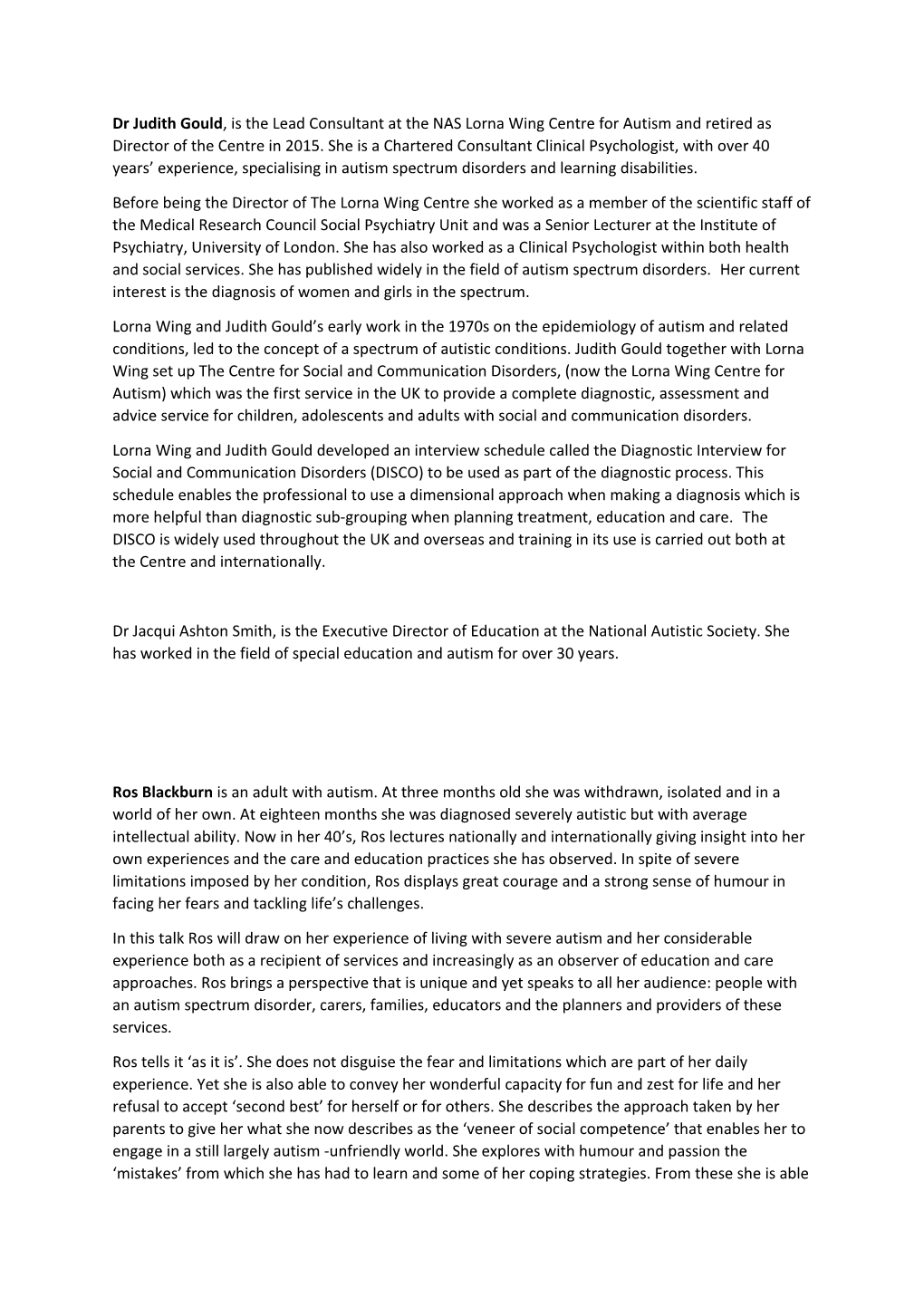Dr Judith Gould, is the Lead Consultant at the NAS Lorna Wing Centre for Autism and retired as Director of the Centre in 2015. She is a Chartered Consultant Clinical Psychologist, with over 40 years’ experience, specialising in autism spectrum disorders and learning disabilities.
Before being the Director of The Lorna Wing Centre she worked as a member of the scientific staff of the Medical Research Council Social Psychiatry Unit and was a Senior Lecturer at the Institute of Psychiatry, University of London. She has also worked as a Clinical Psychologist within both health and social services. She has published widely in the field of autism spectrum disorders. Her current interest is the diagnosis of women and girls in the spectrum.
Lorna Wing and Judith Gould’s early work in the 1970s on the epidemiology of autism and related conditions, led to the concept of a spectrum of autistic conditions.Judith Gould together with Lorna Wing set up The Centre for Social and Communication Disorders, (now the Lorna Wing Centre for Autism) which was the first service in the UK to provide a complete diagnostic, assessment and advice service for children, adolescents and adults with social and communication disorders.
Lorna Wing and Judith Gould developed an interview schedule called the Diagnostic Interview for Social and Communication Disorders (DISCO) to be used as part of the diagnostic process. This schedule enables the professional to use a dimensional approach when making a diagnosis which is more helpful than diagnostic sub-grouping when planning treatment, education and care. The DISCO is widely used throughout the UK and overseas and training in its use is carried out both at the Centre and internationally.
Dr Jacqui Ashton Smith, is the Executive Director of Education at the National Autistic Society. She has worked in the field of special education and autism for over 30 years.
Ros Blackburn is an adult with autism. At threemonths old she waswithdrawn, isolated andin a world of her own. At eighteen months she was diagnosed severely autistic but with average intellectual ability. Now in her 40’s,Ros lectures nationally and internationally giving insight into her own experiences and the care and education practices she has observed. In spite ofsevere limitations imposed by her condition, Rosdisplays great courage and a strong sense of humour in facing her fears and tackling life’s challenges.
In this talk Ros will draw on her experience of living with severe autism and her considerable experience both as a recipient of services and increasingly as an observer of education and care approaches. Ros brings a perspective that is unique and yet speaks to all her audience: people with an autism spectrum disorder, carers, families, educators and the planners and providers of these services.
Ros tells it ‘as it is’. She does not disguise the fear and limitations which are part of her daily experience. Yet she is also able to convey her wonderful capacity for fun and zest for life and her refusal to accept ‘second best’ for herself or for others. She describes the approach taken by her parents to give her what she now describes as the ‘veneer of social competence’ that enables her to engage in a still largelyautism-unfriendly world. She explores with humour and passion the ‘mistakes’ from which she has had to learn and some of her coping strategies. From these she is able to offer helpful advice on practical strategies (and even more helpful advice on whatnotto do!). Her talk also illustrates the problems of having an uneven profile of strengths and weaknesses, where often the strengths mask her very real difficulties and needs. She does not advocate any one approach except that we should remember that peoplewith ASD are people too and that ‘common sense’ should apply. Her position can best be summarised as an insistence on the need for high expectations for people with ASD linkedwithequally high levels of support. In a quote from her mother, Ros pleads that one should ‘nevermake autism the excuse, but help the person overcome the problems caused by it’.
